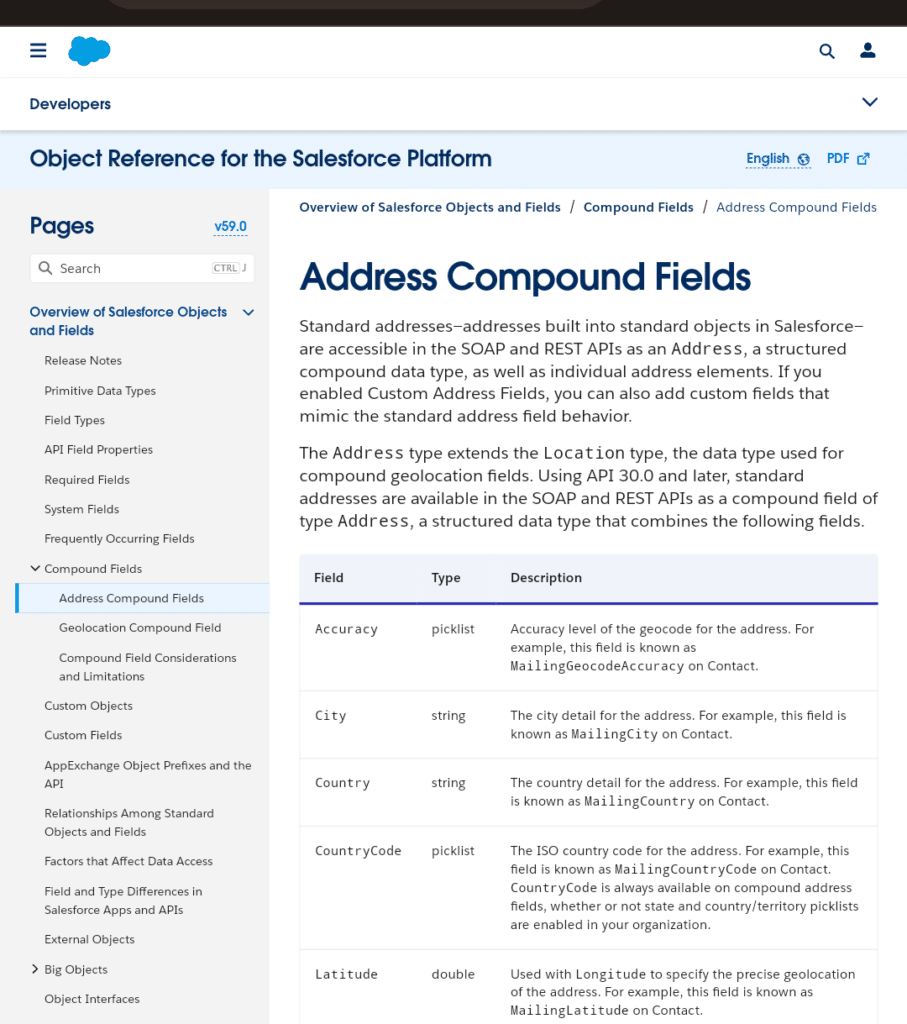Salesforce Address: Success in today’s fast-paced corporate environment depends heavily on one’s ability to manage client data successfully. Businesses have access to a potent toolkit to accomplish this goal thanks to Salesforce, a top customer relationship management (CRM) software. The address field is a vital component of Salesforce’s customer data management. The importance of the Salesforce address field, its capabilities, best practices, and influence on enhancing customer interactions and overall business performance will all be covered in this article.

- Salesforce Address, the leading customer relationship management (CRM) platform, is well known for its extensive set of tools and features created to assist organizations in managing and optimizing their customer relationships. The Salesforce address field is one of the platform’s many features and is essential for efficient client data management. In order to improve communication, target marketing, and legal compliance, organizations must have accurate, confirmed address information for their clients. This unassuming field plays a major part in guaranteeing this. In this succinct introduction, we will examine the significance and potential of the Salesforce address field, emphasizing its role in fostering customer relationships and promoting overall business success.
Table of Contents
ToggleThe Significance of the Salesforce Address Field
The address field in Salesforce address is a crucial component for gathering and organizing client data. It enables companies to keep track of clients’ precise location data, which is necessary for a number of reasons, such as:

1. Geolocation: Salesforce’s address field helps companies identify the precise locations of their clients. For sales and marketing teams that need to target particular geographic areas or adjust their pitch based on geography, this is especially helpful. Businesses may customize their outreach, promotions, and marketing initiatives with the use of accurate geolocation data, which will increase engagement and conversion rates.
2. Improved Customer Communication: Effective communication depends on having consumers’ addresses updated and accurate. Businesses depend on precise addresses to reach their consumers quickly and effectively, whether they’re mailing bills, shipping goods, or setting up service appointments. Salesforce’s address field aids in preventing communication breakdowns due to incomplete or outdated geographic information.
3. Reporting and Analytics: Salesforce provides strong reporting and analytics features that help companies learn crucial details about their clients. Organizations can use the address field to study client distribution by region, spot trends, and come to wise judgments about things like market expansion and resource allocation.
4. Compliance and Legal Requirements: Legal obligations for customer data, including precise address information, exist in many sectors and regions. A company’s reputation may suffer, and there may be legal repercussions if these regulations are broken. The address field in Salesforce helps businesses adhere to these compliance requirements and lowers the likelihood of non-compliance problems.
Capabilities of the Salesforce Address Field
Salesforce offers a range of capabilities within the address field to enhance its functionality and utility. Here are some key features:
1. Standardization: Salesforce offers resources for standardizing address data, guaranteeing accuracy and consistency. This assists in removing discrepancies brought on by incorrect data entry or format changes. Standardized addresses make reporting and communication easier.
2. Validation: The platform provides address validation services that allow users to instantly confirm the accuracy of entered addresses. This lessens the possibility of address data being saved in the system that is incomplete or wrong. The validation tools in Salesforce can also recommend changes for incorrect addresses.
3. Integration: Businesses can enrich their address data with extra details like geographic coordinates, demographic information, and more thanks to Salesforce’s ability to interface with external data sources and APIs. Organizations may improve their consumer profiles and receive deeper insights thanks to this integration feature.
4. Customization: The address field can be customized by businesses to collect details that are pertinent to their operations. This adaptability enables businesses to customize Salesforce to their own requirements and industry standards, ensuring that address data is efficiently used.
Best Practices for Managing Salesforce Address Data
To harness the full potential of the Salesforce address field, businesses should adhere to best practices for data management:

1. Data Cleansing: Review and purge address data frequently to get rid of duplicates, fix mistakes, and update out-of-date information. This guarantees that your Salesforce database is trustworthy and correct.
2. Use Validation Rules: Apply validation rules to address fields to enforce data quality standards. These guidelines can ensure data consistency and prevent the inclusion of incorrect or incomplete addresses.
3. Geocode Addresses: Utilize Salesforce’s geocoding features to translate addresses into locations. For field sales or service teams, this offers accurate mapping, location-based analytics, and effective route planning.
4. Integrate External Data: Look for ways to enhance your address data by integrating external data sources or APIs. This can offer important background and insights that support a deeper understanding of your customers.
5. Train Users: Make sure your Salesforce users receive training to ensure they are aware of the value of proper address data and how to make the most of the platform’s address-related features.
Salesforce address: Impact on Customer Relationships and Business Performance
The Salesforce address field has a direct impact on customer relationships and overall business performance:
1. Enhanced Customer Experience: Businesses may provide a seamless client experience by using accurate and current address data. Customers value attention to detail when it comes to timely product deliveries, personalized suggestion services, or quick service requests.
2. Increased Efficiency: Effective management of address data accelerates numerous business procedures while minimizing errors and manual interventions. Cost reductions, increased productivity, and speedier decision-making are the results of this.
3. Targeted Marketing: Businesses can more successfully target their marketing campaigns with the help of geolocation data. Companies can increase their marketing ROI and client engagement by focusing their campaigns on particular geographies or demographic groups.
4. Data-Driven Insights: Accurate address information gives firms access to useful insights. They are able to make knowledgeable choices regarding customer segmentation, resource allocation, and market expansion, ultimately resulting in business growth and profitability.
Conclusion
A key component of efficient customer data management is the address field in Salesforce, which gives companies the resources they need to collect, verify, and fully utilize address data. Organizations can strengthen customer connections, increase operational effectiveness, and make data-driven decisions that contribute to their long-term success by adhering to best practices and utilizing the platform’s capabilities. Mastering the administration of address data in Salesforce is not simply a best practice in today’s competitive environment; it is a strategic need.




